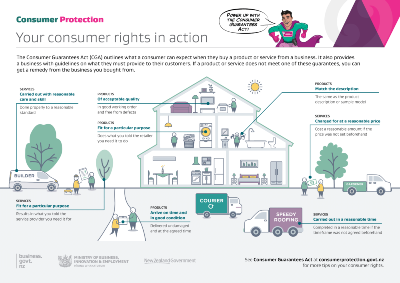
The Consumer Guarantees Act (CGA) protects consumers by:
All New Zealand businesses and people in trade must meet their responsibilities under the CGA. This means if you have a problem with a product or service, you can do something about it.
Find out more about how the CGA protects consumers.

This audio clip outlines your key rights under the Consumer Guarantees Act:
Check with the retailer that the item you’re purchasing will do the job you need it for. If you then find that it does not work as described, you should seek a remedy based on it not being “fit for purpose”.
How well do you know your rights? Take this fun quiz.
Loading content.Please note the following section of content is possibly being delivered from an external source (IFRAME in HTML terms), and may present unusual experiences for screen readers.
You may be covered by the Consumer Guarantees Act (CGA) when you buy consumer products usually for personal or household use, but find they:
Product guarantees apply to new or second-hand goods supplied by businesses within New Zealand. This covers all kinds of personal property, including software, animals, and plants.
The CGA does not apply to:
Businesses can agree in writing that the CGA doesn't apply if personal or household products are bought for business use, for example, a vacuum cleaner for use in a shop.
If you bought an item online from an overseas seller, the Act might still apply but it becomes much more difficult to resolve issues and enforce your rights.
Both new and second-hand consumer products must meet the guarantees of:
This means that products must be:
This is based on whether a reasonable consumer would find the products acceptable considering:
If the retailer or manufacturer arranges for the products to be delivered to you, the products must be of acceptable quality when you receive them.
Products must be fit for a particular or special purpose that:
This guarantee doesn't apply if you don't act on the supplier's advice.
Claims that retailers or manufacturers make about what products can do may also be covered by this guarantee.
Many products are sold with a description. The products you receive must be the same as the description in a catalogue, online, or on packaging and labels. The products that you buy must be the same as any sample or demonstration model shown by the trader.
This guarantee only applies when there has been no agreement about the price and the products have not yet been paid for. Usually, the price is agreed in advance — either on a price tag or on a sign displayed with the products, or at the checkout. But if not, you must only pay a reasonable price (that is, what other traders charge for the same or similar products).
If you think the price is unreasonable but you pay it without disputing it at the time, the law says you have agreed to the price and can’t dispute it (affirmation).
While businesses are free to set their own prices and increasing prices above levels charged previously isn’t illegal in New Zealand, the Fair Trading Act prohibits misleading and deceptive conduct and false representations.
This means that if a business gives a reason for a price increase it must be true or the business risks breaching the law. Consumers should ask for the reason a price has increased and if they believe the reason that is given is not true, they should make a complaint to the Commerce Commission.
The retailer or trader should be able to pass all the ownership rights or title in the products to you.
This means they guarantee:
Traders can still sell second-hand products with a registered security interest (for example, they sell you a car that they're still paying off with a finance company), but they must disclose this to you before you buy.
Products must be of acceptable quality when you receive them. If products arrived damaged, you could claim a remedy (such as repair or replacement) from the trader.
The delivery must also:
If products are very late, or arrive far later than the agreed period, you can reject them.
Manufacturers and importers can meet this guarantee by:
Manufacturers or importers can legally opt out of this guarantee by giving you notice that spare parts and repairs will not be available or will be limited.
This guarantee only applies to the first person to buy the products in New Zealand. This means that the guarantee only applies to new products and to the first purchaser of imported second-hand products.
The Consumer Guarantees Act (CGA) gives you the right to seek a remedy, such as a repair or a replacement, from the manufacturer whether or not the products come with a manufacturer’s warranty (called an “express guarantee” in the Act).
Manufacturers do not have to provide a written warranty with their products. However, if they choose to do so, the Act says they must meet their obligations under that warranty. The CGA still applies whether or not a manufacturer's warranty has expired.
You should be able to seek a repair, replacement, or refund if the product does not meet one or more of the guarantees.
![]()
Use our consumer rights finders for products, services, after buying a car, and flights. Check your rights
When a business supplies you with consumer services, such as subscription services, household plumbing, a haircut, or fixing your car, four consumer guarantees apply under the Consumer Guarantees Act (CGA).
Services include any rights, benefits or facilities provided by a supplier, even if they do so free of charge or you don’t have a contract with the supplier.
The CGA also specifies a wide range of contracts that are services, such as:
Contracts and quotes for services can include extra rights and responsibilities and specific information for both you and the provider, for example, cancellations, pricing, timeframes. The provider or business cannot include conditions in the contract which erase your rights under the Act.
For more information on contracts, quotes, and estimates, including types of contracts and the language they use, see:
All consumer services must be:
This generally means that any work done must be at least as good as the work of a competent person with average skills and experience for that type of work.
Reasonable skill is about applying technical know-how. Reasonable care is how much care is taken to do the job properly.
When you’ve told the service provider what work you want them to do and they accept the job, they must make sure you get what you want.
If the service provider can’t guarantee the work they’ll do will give you the result you want, they have to tell you before they start the job. But they can’t simply get out of their responsibilities by warning you that the job may not be satisfactory if they are inexperienced in that trade.
If they used reasonable skill and care but the work doesn't meet your expectations because you weren't clear about what you wanted, the trader may not be responsible.
When you are given a choice of options for the work at different prices, if you take the lowest price option it may be less fit for purpose. It is reasonable that you may have lower expectations due to the cheaper cost.
Sometimes it may not be appropriate for you to rely on discussions with an employee of that service provider, eg the receptionist in a large service company. Where possible, make sure you speak to the person who's doing the work, or who's responsible for making sure you get what you've asked for.
If you insist on a service that the supplier tells you won’t give the result you want, you might not be able to rely on the ‘fit for purpose’ or ‘reasonable care and skill’ guarantees.
If you and the service provider haven’t agreed on a time to finish a job, the provider must do so within a reasonable time. Reasonable time is judged on the time it takes a competent person who works in that type of job to complete the task.
If you and the service provider haven’t agreed a price for the job, you only must pay a reasonable price. You can work out what a reasonable price is by finding out what other providers in your area are charging for similar services.
You should be able to seek a repair, replacement, or refund if the service does not meet one or more of the guarantees.
Electricity and gas services must meet a specific guarantee of acceptable quality. This guarantee applies instead of the general CGA guarantees that apply to products and services.
The CGA does not apply to:
Businesses can agree in writing that the CGA doesn't apply if personal or household services are bought for business use, such as carpet cleaning in a shop.

Businesses who sell products or services have a right to:
Businesses must not:
The Consumer Guarantees Act (CGA) applies to consumers buying things in New Zealand, and businesses selling products or services in New Zealand.
A consumer is anyone who buys products or services that are ordinarily for personal or household use. The ordinary use may change over time, for example, computers are now commonly used for personal use.
Organisations and businesses who buy consumer products or services from other businesses are also entitled to protection under the Act, unless the seller has contracted out of the CGA.
The CGA applies to any business providing consumer products or services, including:
Online sellers who operate as businesses (such as on Trade Me) must make it clear to buyers that they are traders. This tells consumers that the Fair Trading Act and Consumer Guarantees Act apply.
The CGA applies to consumer products and services supplied by businesses, including if they're:
Consumer guarantees do not apply if you:
If you buy something online from an overseas trader, the Act might still apply, but it becomes much more difficult to resolve issues and enforce your rights.
A retailer or supplier must not tell you the CGA does not apply or try to get you to sign a contract saying it doesn't apply.
The only exception is where products or services are for a business purpose and:
A manufacturer can contract out of the spare parts and repair facilities guarantee, but only if consumers are told this in writing before they buy the products.
A business who tries to contract out of the CGA in any other circumstances commits an offence under the Fair Trading Act.
Even if the Consumer Guarantees Act doesn’t apply, other consumer laws may.
How to work out whether you have a case to make a complaint about a product or service you’re unhappy with:
If a business sells you a faulty product, you should first ask them to fix the problem. This might involve a refund, replacement, or repair.
Every situation and product is different, but your options should include whether the product:
If you have a problem with a service, contact the service provider to start with. Explain the problem and what you would like done about it.
For general enquiries please contact us